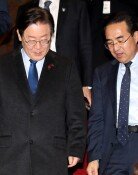Biased Assertion Holds Up FTA Ratification
Biased Assertion Holds Up FTA Ratification
Posted February. 05, 2004 23:28,
Under the conditions that the diverse pending problems such as the Korea-Chile Free Trade Agreement (FTA) and the renegotiation of the rice market have remained and are being ignored several indications have appeared that the “misconstruction and evasion” of the realities are pressing the trade negotiations.
In particular, if the ratification of FTA bill, which is scheduled to be handed into the congress on February 9, is rejected again, it is expected that the tardiness may impair Korea’s reputation overseas and degrade the competitiveness of Korean products on a large scale.
According to the trade experts and the government officials on February 5, some parts of the political world and several private organizations, in accordance with trade problems, misconstrued the realities rather than regarding it as it is, imposing a heavy burden on the country.
Regarding the lifting the ban on the imported rice market, a high-level official remarked, “In order to delay the opening of the rice market toward overseas for an additional period, we have to take measures to reward it at the level that can persuade the opponent country including the industrial products also.” He retorted, “Can it be possible?”
Practically, there is no alternative except the opening. However, some politicians and organizations are convincing the farmers otherwise.
In addition, some congressman and the non-governmental organizations have asserted, in connection with the Korea-Chile FTA, that “Chile is the third strongest farming country in the world. The foundation of agriculture in Korea will be devastated by the agreement.”
According to this, “Chile’s largest agricultural items--apple, pear, and grape which are accounting for 62.2 percent of Chile’s total exports--have been excluded on the FTA list. Their agricultural products stand at only 14th in the world export ranking,” retorted Kim Byung-seop, the chief of mutual trade department of Foreign Affairs and Trade Ministry.
In the report issued on February 5, Ministry of Commerce, Industry and Energy (MOCIE) forecasted that due to the tons of FTA effectuation among the countries, Korea will face a deadlock in exporting the products worth $300 million.
“As the preferential trade between the countries under the FTA agreement is increasing, the export competitiveness of the Korean products bears a heavy burden,” remarked Lee Seung-hoon, the trade policy inspector of MOCIE, adding, “If the FTA negotiations, which are currently going on between Japan and Mexico and Indonesia and Thailand are concluded, approximately $600 million in losses will be created by the export of Korea.”
“The FTA bill acceptance of Chilean congress last month was carried out due to the belief in the explanation of Korean government that the FTA bill would soon be accepted in the congress,” said the Foreign Affairs and Trade Ministry, adding, “If the bill does not pass through the congress again on February 9, a large scale aftermath will be followed up.” There are many voices with concerns about the absence of the system which can harmonize the dissenting opinions among the organs of the government. “There are some cases that a mere administrative official participated in the meeting supervised by the deputy minister or assistant deputy, instead of his or her seniors,” pointed out a professor specialized in the trade negotiation, adding, “We have no system which can sort out the discords between the government agencies.”
Eun-Woo Lee libra@donga.com







